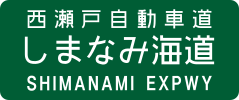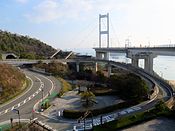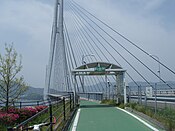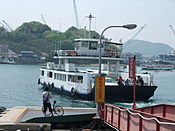Nishiseto Expressway
| Nishiseto Expressway | |
|---|---|
 | |
| Route information | |
| Length | 59.4 km (36.9 mi) |
| Existed | 1979–present |
| Component highways | |
| Major junctions | |
| From | Nishiseto Onomichi Interchange in Onomichi, Hiroshima |
| To | Imabari Interchange in Imabari, Ehime |
| Location | |
| Country | Japan |
| Highway system | |
The Nishiseto Expressway (西瀬戸自動車道, Nishiseto Jidōsha-dō), often called the Shimanami Kaidō (しまなみ海道), is an expressway in Japan that connects Onomichi, Hiroshima and Imabari, Ehime, going through nine of the Geiyo Islands, including Ōshima, Ōmishima, and Innoshima. The road and multiple bridges crossing across the Seto Inland Sea is one of the three main transportation links of the Honshū–Shikoku Bridge Project, constructed between the islands of Honshu and Shikoku.
The expressway contains fifty-five bridges, including the Kurushima Kaikyō Bridge, the world's longest series of suspension bridges, and the Tatara Bridge, the world's fourth longest cable-stayed bridge. The route is famed for its scenic views and can be crossed by bicycles, mopeds and pedestrians as well as cars. It was opened on May 1, 1999, and is 59.4 kilometres (36.9 miles) long, sporting four lanes with a separated path for pedestrians and cyclists.[1]
Cycle tourism[edit]
The road and bridge route was designed with an integrated cycle lane linking Onomichi in Hiroshima Prefecture with Imabari in Ehime Prefecture. The cycle route is approximately 70 kilometres (43 miles) in length, including bridge access ramps, and since opening has become one of Japan's most popular long-distance cycle routes.
As accessing the Shin-Onomichi bridge involves a steep climb, cyclists are encouraged to use a short ferry between Onomichi and Mukaishima, but all other bridges on the route feature a designated cycle path. Bicycle rental and drop off locations are available along the route.[2]
The route is a toll road, but tolls were waived for cyclists until March 31, 2022, in an effort to promote tourism.[3]
Gallery[edit]
-
Cycle access ramp to the Kurushima-kaikyo Ohashi Bridge
-
Shimanami Kaido cycle access ramp at Imabari
-
Designated cycle lane on the Tatara Bridge
-
Onomichi ferry. Northern starting point of Shimanami Kaido cycle route.
See also[edit]
References[edit]
- ^ "E76 SHIMANAMI EXPWY(Nishi-Seto Expressway)". Honshu-Shikoku Bridge Expressway Company. Retrieved 14 April 2018.
- ^ "Shimanami Kaido Tourist Information". Shimap. Retrieved 4 April 2016.
- ^ "Onomichi Travel: Shimanami Kaido". www.japan-guide.com. Retrieved 4 May 2017.
External links[edit]
- Nishiseto Expressway at the Honshu-Shikoku Bridge Authority
- Shimanami Kaido Cycle Route Information in English





